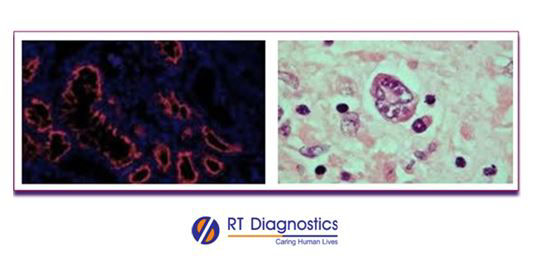CD-15 IHC MARKER:
Why CD15 IHC Marker Test?
CLINICAL INFORMATION
The glycan determinant CD 15 is also known as Lewis x or Le(x) or LeuM1, or 3-fucosyl –N-acetyl-lactosamine, is a distinguished marker for human myeloid cells (CD 15/BRA4F1 reacts with human CD15 antigens present ion myeloid cells, mainly granulocytes, macrophages, and stem cells – but not on B cells, T cells, monocytes, erythrocytes or platelets) and mediates neutrophil adhesion to dentritic cells. This granulocyte marker helps to study chemotaxis and phagocytosis. CD 15 is expressed in granulocytes, malignant lymphomas, Hodgkin lymphoma, and acute myeloid leukemias. Hence CD15 IHC Marker Test helps in the diagnosis of Hodgkin lymphoma, a membranous, diffuse cytoplasmic or Golgi staining of Reed-Sternberg cells used to confirm the diagnosis or to differentiate Hodgkin lymphoma (CD 15+) and CD 30+ from anaplastic large cell lymphoma (usually CD15+) and CD 30+.

General Instructions:
Sample Requirement: Specimen - Blood sample collected from the vein. Test Preparation: None.
NOTE - Sample for specimen collections may vary based on the patient’s condition/cases according to the patient’s presenting complaints/signs or symptoms:
SPECIMEN REQUIREMENT (Special or Rare Cases) - As instructed and guided by Physician / Clinician / Pathologist / as per Laboratory’s requirements, according to procedures and protocols.
Sample Requirement: Blood Sample taken from the vein
Test Preparation: None
This Multi-Specialty Clinical Referral Laboratory RT DIAGNOSTICS provides precise and accurate tests with an extensive range of testing services to the medical centers to help in the diagnosis and identification of pathology in the test specimens for infectious diseases and also to evaluate the function of organ systems of the patient. It prevents further complications and helps to stabilize and restore health to near normalcy at the earliest without delay.



